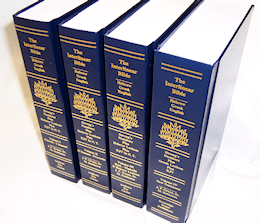Textus Receptus Bibles
Jay P. Green's Literal Translation 1993
| 16:1 | In the seventeenth year of Pekah the son of Remaliah, Ahaz the son of Jotham the king of Judah began to reign. |
| 16:2 | Ahaz was a son of twenty years when he began to reign, and he reigned sixteen years in Jerusalem; and he did not do the right in the eyes of Jehovah his God, like his father David. |
| 16:3 | But he walked in the way of the kings of Israel, and also he caused his son to pass through the fire, according to the idolatries of the nations, whom Jehovah had cast out from before the sons of Israel. |
| 16:4 | And he sacrificed and offered incense in the high places, and on the heights, and under every green tree. |
| 16:5 | Then Rezin the king of Syria and Pekah the son of Remaliah the king of Israel came up to Jerusalem to war. And they besieged Ahaz, but they were not able to fight. |
| 16:6 | At that time Rezin the king of Syria brought Elath back to Syria, and threw the Jews out of Elath; and the Syrians came to Elath and lived there to this day. |
| 16:7 | And Ahaz sent messengers to Tiglath-pileser the king of Assyria, saying, I am your servant and your son; come up and save me out of the hand of the king of Syria, and out of the hand of the king of Israel, who have risen up against me. |
| 16:8 | And Ahaz took the silver and the gold which was found in the house of Jehovah, and in the treasures of the king's house, and sent to the king of Assyria a bribe. |
| 16:9 | And the king of Assyria listened to him. And the king of Assyria went up to Damascus and captured it, and removed it to Kir, and he killed Rezin. |
| 16:10 | And king Ahaz went to meet Tiglath-pileser the king of Assyria at Damascus. And he saw the altar that was in Damascus. And king Ahaz sent the form of the altar to Urijah the priest, and its pattern, according to all its work. |
| 16:11 | And Urijah the priest built the altar according to all that king Ahaz had sent from Damascus; so Urijah the priest did until king Ahaz came in from Damascus. |
| 16:12 | And the king came in from Damascus, and the king saw the altar; and the king drew near to the altar and offered on it; |
| 16:13 | and offered his burnt offering, and his food offering, and poured out his drink offering, and sprinkled the blood of his peace offerings on the altar. |
| 16:14 | But as to the bronze altar that was before Jehovah, he brought near from the forefront of the house, from between his altar and the house of Jehovah, and put it on the north side of his altar. |
| 16:15 | And king Ahaz commanded Urijah the priest, saying, On the great altar offer the burnt offering of the morning, and the evening food offering, and the king's burnt offering and his food offering with the burnt offering of all the people of the land, and their food offering, and their drink offerings; and sprinkle on it all the blood of the burnt offering, and all the blood of the sacrifice; but the bronze altar shall be for me to inquire by. |
| 16:16 | And Urijah the priest did according to all that king Ahaz commanded. |
| 16:17 | And king Ahaz cut off the borders of the bases, and removed the laver from them; and took down the sea from off the bronze oxen under it, and put it on a pavement of stones. |
| 16:18 | And the covered way that they had built in the house for the sabbath, and the king's entry outside, he turned from the house of Jehovah, because of the king of Assyria. |
| 16:19 | And the rest of the acts of Ahaz that he did, are they not written in the Book of the Matters of the Days of the Kings of Judah? |
| 16:20 | And Ahaz lay with his fathers, and was buried with his fathers in the city of David. And his son Hezekiah reigned in his place. |

Green's Literal Translation 1993
Green's Literal Translation (Literal Translation of the Holy Bible - LITV), is a translation of the Bible by Jay P. Green, Sr., first published in 1985. The LITV takes a literal, formal equivalence approach to translation. The Masoretic Text is used as the Hebrew basis for the Old Testament, and the Textus Receptus is used as the Greek basis for the New Testament.
Green's Literal Translation (LITV). Copyright 1993
by Jay P. Green Sr.
All rights reserved. Jay P. Green Sr.,
Lafayette, IN. U.S.A. 47903.